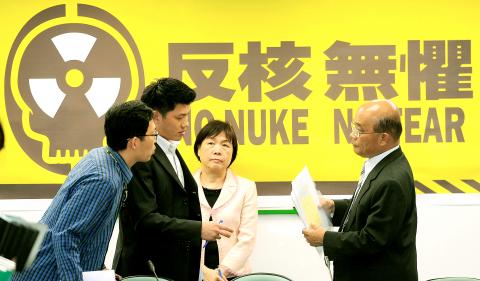The Democratic Progressive Party (DPP) yesterday said it plans to organize more than 1,000 anti-nuclear events before June to raise national awareness of the anti-nuclear movement, which would be instrumental in passing a referendum proposed by the government, scheduled to be held later this year.
The events are being organized by DPP members across the country, including by local offices, legislators and local government officials, and they are to be held in various forms, such as outdoor theaters, film screenings, rallies and bicycle rides, DPP spokesperson Lin Chun-hsien (林俊憲) said after the party’s weekly Central Standing Committee meeting.
While the DPP has argued that the government should directly order the suspension of construction of the controversial Fourth Nuclear Power Plant in New Taipei City’s (新北市) Gongliao District (貢寮) amid strong public opposition to the project, Lin said the party realizes that it will likely have to fight a battle as the government is insisting on resolving the controversy in a national referendum.

Photo: Lo Pei-der, Taipei Times
The party hopes to mobilize at least 10,000 people — a minimum of 100 at each event — so that they can become “seed drill masters” and influence more people by spreading the anti-nuclear message.
Opposition to the power plant has been rising, with 73.8 percent of respondents in the DPP’s most recent survey supporting the suspension of construction, while 14.8 percent supported the completion of the project, Lin said, citing a survey conducted by the party’s Poll Center on Tuesday.
The poll collected 1,031 valid samples and has a margin of error of 3 percentage points.
Meanwhile, the New Taipei City Council yesterday passed a resolution demanding that the central government suspend the construction of the power plant, becoming the first local council to make the demand.
The survey and the resolution in New Taipei City, where three nuclear power plants are located, shows that a high degree of consensus has been reached on the issue and that the anti-nuclear movement is now a campaign, DPP Chairman Su Tseng-chang (蘇貞昌) said.
As the entire country has been engaged in a heated debate over the use of nuclear energy as a source of electricity, the nation should step up its efforts to save energy, which is of equal importance to abandoning nuclear energy, Su said.
The DPP’s support for “green” energy is clear, Su said, adding that the utilization of solar energy and light-emitting diodes, among other things, are attainable goals.
“It is also important to break Taiwan Power Co’s monopoly of electricity production, distribution and sale,” Su said.

CHANGING LANDSCAPE: Many of the part-time programs for educators were no longer needed, as many teachers obtain a graduate degree before joining the workforce, experts said Taiwanese universities this year canceled 86 programs, Ministry of Education data showed, with educators attributing the closures to the nation’s low birthrate as well as shifting trends. Fifty-three of the shuttered programs were part-time postgraduate degree programs, about 62 percent of the total, the most in the past five years, the data showed. National Taiwan Normal University (NTNU) discontinued the most part-time master’s programs, at 16: chemistry, life science, earth science, physics, fine arts, music, special education, health promotion and health education, educational psychology and counseling, education, design, Chinese as a second language, library and information sciences, mechatronics engineering, history, physical education

DEADLOCK: As the commission is unable to forum a quorum to review license renewal applications, the channel operators are not at fault and can air past their license date The National Communications Commission (NCC) yesterday said that the Public Television Service (PTS) and 36 other television and radio broadcasters could continue airing, despite the commission’s inability to meet a quorum to review their license renewal applications. The licenses of PTS and the other channels are set to expire between this month and June. The National Communications Commission Organization Act (國家通訊傳播委員會組織法) stipulates that the commission must meet the mandated quorum of four to hold a valid meeting. The seven-member commission currently has only three commissioners. “We have informed the channel operators of the progress we have made in reviewing their license renewal applications, and

The High Prosecutors’ Office yesterday withdrew an appeal against the acquittal of a former bank manager 22 years after his death, marking Taiwan’s first instance of prosecutors rendering posthumous justice to a wrongfully convicted defendant. Chu Ching-en (諸慶恩) — formerly a manager at the Taipei branch of BNP Paribas — was in 1999 accused by Weng Mao-chung (翁茂鍾), then-president of Chia Her Industrial Co, of forging a request for a fixed deposit of US$10 million by I-Hwa Industrial Co, a subsidiary of Chia Her, which was used as collateral. Chu was ruled not guilty in the first trial, but was found guilty

Taiwan People’s Party (TPP) Chairman Huang Kuo-chang (黃國昌) yesterday appealed to the authorities to release former Taipei mayor Ko Wen-je (柯文哲) from pretrial detention amid conflicting reports about his health. The TPP at a news conference on Thursday said that Ko should be released to a hospital for treatment, adding that he has blood in his urine and had spells of pain and nausea followed by vomiting over the past three months. Hsieh Yen-yau (謝炎堯), a retired professor of internal medicine and Ko’s former teacher, said that Ko’s symptoms aligned with gallstones, kidney inflammation and potentially dangerous heart conditions. Ko, charged with